So, I got this submission for a mom quote…and like the ethnocentric American I sometimes can be, I wrote her back and asked her what state she lived in. That’s when I learned that this mom is an American stay-at-home-mom to two small children living in Palestine. Intrigued, I asked if I could interview her for TheMommyhood.com so we can learn about her motherhood experience. It’s really fascinating. Thanks for sharing with us, Ravyn!
Where are you originally from and when/why did you relocate to Palestine?
I am from Michigan but spent 13 years in Austin, TX before moving to Ramallah, Palestine six months ago with my three-year-old son and one-year-old daughter. My husband is Palestinian and found a good job opportunity in Ramallah. Plus, the kids get to be near their grandparents.
What do you like about raising kids in Palestine?
I like the love people have for children here. It is not unusual for my kids and I to be out and get stopped by people who just want to fawn over them. Shop owners always have a little treat like a balloon, a sticker or a cookie for the kids.
I also love the sense of integration with the community. It’s true that kids here face incredible challenges, and I don’t want to romanticize their situation, but for better or worse kids are always visible in a way that I didn’t notice in the states. They buy groceries on their own, go out late with their parents, and sleep wherever their parents are visiting. I hear their voices at all hours of the day. There is a cohesive feeling of community made of all ages – I like that feeling.
What are some of the challenges?
The playgrounds are a mess. They are covered in trash and broken equipment and are built without safety codes. Kids here play in the streets – literally in the streets. For a SAHM like me, the days are LONG trying to find something fun and safe to do outside our home.
I think my biggest challenge, though, is finding playmates for my kids and mom-friends for myself. The culture and economy don’t support SAHM-hood. Almost without exception children are in daycare and moms are working. I have been pretty lonely, day in and day out only seeing my children. I firmly believe that families need community and in particular that moms are not meant to mother their children in isolation. I write about these challenges a lot on my blog (way more than my MIL would like).
Describe your Palestinian home. How is it different than your American home?
Most people live in and own an apartment or condo. We have the ground floor of a 10-unit high-rise. Building materials are exclusively stone or cement, not wood. Floors are stone, walls are cement, and all lower-level windows have decorative bars. This is so that we can keep our windows open during the summer months and not worry about break-ins.
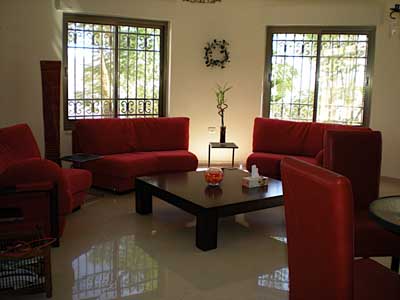
Ravyn's furnished apartment before she and her family moved in. It was formerly a business similar to a bridal salon.
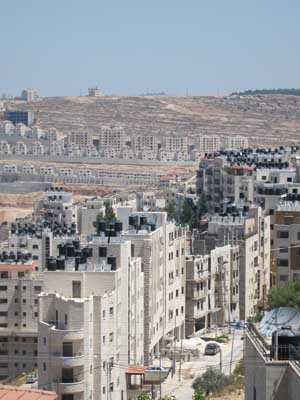
Housing in Ramallah
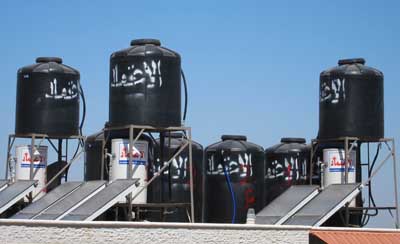
According to Ravyn, everyone stores extra water in big black plastic tanks on their roof for when Israel shuts the water off and when people conserve water during the summer. She said they are roughly the size of an SUV and they have two that are piped to their apartment.
Every home also has solar panels, which struck me as odd because in the U.S. solar panels are expensive. In order to get hot water, we wait until the sun has been over the panels for a few hours, or we flip a wall switch and heat a small boiler tank that holds enough for a fast shower. It requires planning.
Finally, my house has no less than 30 keys for its various doors and this is not unusual here. No two doors have the same key! And it takes a key to both get in AND to get out–as in if my front door is locked and I can’t find my key I can’t get out.
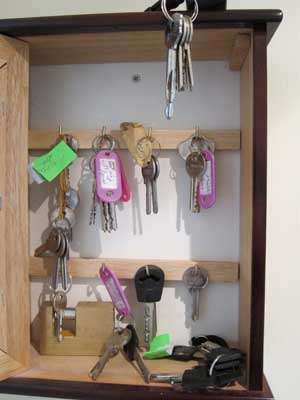
Since your blog is called Piles of Laundry in the Holy Land, how is doing laundry different at your house than it was in the U.S.?
MUCH smaller machines and everyone dries their clothes on lines or racks outside. Also, the laundry water empties by hose into the toilet…which I forget to put in sometimes and flood the floor. Sucks. And all detergents are HIGHLY scented.
Do you have a babysitter or preschool for your kids to attend so that you get a break?
Um…no. I wish I did. My mother in law takes my son for three hours once a week so I can have time with my daughter. Sweet, but not a break. I am not comfortable with the schools here, particularly for very young children like mine and babysitting is something that I would explore if I were more comfortable with discipline methods and had been here longer. My kids are quite young and close in age, which means they are quite a lot to handle.
I actually wrote these questions at an iHop. Can you get a pancake in Palestine?
We searched high and low for pancakes (my son LOVES them) and found one place that does them. ONE. And there is no real maple syrup anywhere (I don’t count Aunt Jemima). We eat grape molasses or Nutella with them. Oh how I miss a great breakfast place! I make pancakes here at home all the time now. And I seriously miss doughnuts.
Do you make American food at home? And can you get what you need to do so?
Sort of. Shopping may be the hardest thing for me. First off, grocery stores are small. Fruits and veggies come from a green grocer, meats from a butcher, fish from a fishmonger, etc. Imagine lugging two babies through four stores just to do your food shopping!
Groceries are tailored to meet the needs of people cooking seasonal Palestinian foods; meaning the availability of ingredients varies by season, which is something I never had to think about before. For example, right now there is no good spinach available and no other greens of any kind. Fish is only available on Friday’s and Saturdays when fishmongers get them from the coast–and even then we only get two kinds.
How has living in Palestine changed you – and how does that affect you as a mom?
My view of the world and my concept of my place in it have changed dramatically. As a mother, I think the most visible change is one that I’m almost embarrassed to admit: I am less uptight with my kids about dirt and trash and strangers. Also, I am more willing to go try something I am not sure I can do and push our boundaries as a trio of mom and two young kids out together. And I am more keenly aware of my responsibility to choose the environment in which my kids grow up.
How are Palestinian mom-friends the same or different than the mom-friends you knew in the states?
Moms here tend to be less involved in their kids emotional lives from what I can tell. They don’t intervene on the playground; they don’t talk through meltdowns or reason with their kids. They tend to be stricter but also more lenient about naps, bedtime, and letting their kids go play alone outside. I have often felt that Palestine is like America in the 1950s: spanking is normal, kids roam freely in the back (and front) seats of moving cars, and there are high demands for kids to behave and be polite. Gender roles are strongly enforced. But for all that, kids are loved and valued. They just aren’t as sheltered from the dangers of the world and maybe that’s because it’s impossible here.
What do you want other people to know about Palestine that they might not know?
I want people to know how friendly Palestinian people are and how welcoming the culture is. As for the political/social situation, you can read more here in the full text of the interview. There are also more pictures and a video.
—
Ravyn Abboushi is the mother of a 3.5 year-old son named Sufyan and a 1.5 year-old daughter named Laila. She is a SAHM in the Ramallah, Palestine and chronicles her adventures on her blog Piles of Laundry in the Holy Land.







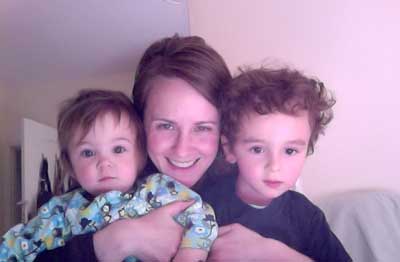


Wow!! What an eye-opening interview. So nice to “meet” you. Your children are so cute. And the water supply thing is crazy! It makes me feel sad to know how much we take water for granted here in the U.S. Thanks for sharing your story with all of us
Thanks for taking the time to read and comment. yes, the water supply thing is just so intense. It’s taken me all this time to come to terms with that particular fact. I can’t believe how easy I had it in the states.